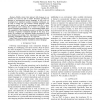Free Online Productivity Tools
i2Speak
i2Symbol
i2OCR
iTex2Img
iWeb2Print
iWeb2Shot
i2Type
iPdf2Split
iPdf2Merge
i2Bopomofo
i2Arabic
i2Style
i2Image
i2PDF
iLatex2Rtf
Sci2ools
113
click to vote
HRI
2010
ACM
2010
ACM
Following directions using statistical machine translation
—Mobile robots that interact with humans in an intuitive way must be able to follow directions provided by humans in unconstrained natural language. In this work we investigate how statistical machine translation techniques can be used to bridge the gap between natural language route instructions and a map of an environment built by a robot. Our approach uses training data to learn to translate from natural language instructions to an automatically-labeled map. The complexity of the translation process is controlled by taking advantage of physical constraints imposed by the map. As a result, our technique can efficiently handle uncertainty in both map labeling and parsing. Our experiments demonstrate the promising capabilities achieved by our approach.
HRI 2010 | Human Robot Interaction | Natural Language | Natural Language Route | Unconstrained Natural Language |
Related Content
| Added | 17 May 2010 |
| Updated | 17 May 2010 |
| Type | Conference |
| Year | 2010 |
| Where | HRI |
| Authors | Cynthia Matuszek, Dieter Fox, Karl Koscher |
Comments (0)

